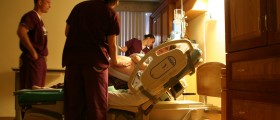
Down syndrome is a condition which was first diagnosed by John Langdon Down. This is the most common birth defect in the US, affecting one in every 800 newborns each year. This means that about 6,000 children are born with this syndrome each year. Unfortunately, only 50% of people with Down syndrome manage to live longer than 50 years while 85% of them survive for just one year. Currently, there are about 350,000 people with Down syndrome living in the US.
Reasons behind Down Syndrome
Down syndrome is a condition triggered by an extra chromosome located on the 21st chromosome. Therefore, this condition is also called trisomy 21. The faulty gene may come either from the sperm or the fertilized egg. Thus, the parents are the carriers. If Down syndrome is considered to be regular, every cell in the body of the affected person contains the extra chromosome.
Other Types of Down Syndrome
Mosaic trisomy 21 is a variant of Down syndrome. This extremely rare condition manifests through the extra chromosome being present in some cells while being absent in others. This variant develops after the fertilization.
Finally, translocation trisomy is yet another type manifesting through the faulty part of the 21st chromosome being transferred and attached to another chromosome, usually the 13th. Here, the carriers have 45 chromosomes instead of 46, while, at the same time having all the genetic material of a healthy person.
Chances and Risks regarding Down Syndrome
If a couple gets a child with Down syndrome, there is a high likelihood that the same might happen in future pregnancies too. If this is the case, one of the parents is classified as a balanced carrier of the faulty genes.
Trisomy 21 can be prevented if the parents undergo genetic testing before the pregnancy takes place. Also, age of the mother is crucial when it comes to possibility of the occurrence of Down syndrome.
Statistically, mothers who are 20 years old give birth to children with trisomy 21 in 1 in every 1,600 cases. On the other hand, 25-year-old mothers experience this once in every 1,300 occurrences while for women who are 30 years old these odds are one in a 1000. Also, every 366th child may suffer from Down syndrome if the mother is 35 years old, while the chances become one in 90 for mothers who are 40 years old and one in 30 for women of 45.
People who suffer from Down syndrome rarely have children of their own. Namely, only 50% of such women are fertile and they have the same percentage of chances that their children will share their condition. So far, men with this condition have not had children.

















Your thoughts on this
Loading...